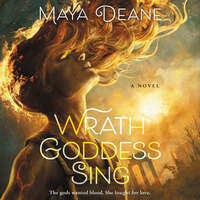Take a photo of a barcode or cover
the most unrealistic part of this book was Agamemnon being hot
adventurous
challenging
dark
slow-paced
Plot or Character Driven:
A mix
Strong character development:
Yes
Loveable characters:
Complicated
Diverse cast of characters:
Complicated
Flaws of characters a main focus:
Yes
dark
emotional
hopeful
mysterious
reflective
sad
tense
medium-paced
Plot or Character Driven:
Character
Strong character development:
Yes
Loveable characters:
Complicated
Diverse cast of characters:
Yes
Flaws of characters a main focus:
Yes
adventurous
dark
emotional
hopeful
mysterious
reflective
sad
tense
fast-paced
Plot or Character Driven:
Character
Strong character development:
Yes
Loveable characters:
Yes
Diverse cast of characters:
Yes
Flaws of characters a main focus:
Complicated
mysterious
sad
tense
medium-paced
Plot or Character Driven:
A mix
Strong character development:
Yes
Loveable characters:
Complicated
Diverse cast of characters:
Yes
Flaws of characters a main focus:
Yes
A really beautiful book, though the flaws of Achilles are maintained and frustrated me to a great degree. I did enjoy the weaving of Briseis and Agamemnon's relationship and rift between Achilles into the story and thought all that was quite fun and well done. The ending was so sad and also rending in Achilles' ability to perish from something the rest of us kallai cannot.
Graphic: Death, Slavery, Pregnancy, War
Takeaways: hot, powerful flawed hubristic trans woman Achilles is gradually (and tragically) pulled into an inescapable war between gods in an Iliad adaptation which reshapes its story around both the transness of central players and the idea that gods fed on human sacrifice bend reality around themselves.
This is both a very nerdy story-- plenty of inventive and semi-plausible details about careful Egyptian non-involvement in the war, ancient hormone herbalism, Hittite kingdoms, Amazon culture in Anatolia, linguistic differences between similar ethnic groups, gender mores, etc-- and a very prosy-prose, richly textured fantasy. We start with atheist Achilles who lives in a real world untouched by godly magic, whose worldview is completely reshaped by magical intervention by Athena and an upsetting breakup with her girlfriend. After this, Achilles grows into her birthright as a demigod-- and to be a demigod is not a really pleasant experience. Fed on battle sacrifices, she finds that Helen is also a demigod, a reincarnation of an ancient Golden Apple that destroyed past generations of gods during periods of climate change and cultural upheaval. She wants to kill Helen, but Helen's magic is too powerful-- so she is forced to search for different weapons that could kill a god, and plod, bound like the Achilles in the original fable, toward her own doom. But because this is an epic, lush fantasy story, even that doom comes wrapped up in more stories about the origin of goddesses and gods. This isn't history-- it's tale-telling, and it's kind of awesome and restorative to have the ancient-goddess story from a trans perspective too (the first Goddess rendered here as a stone age trans woman who reveals hidden truths by performing self-surgery). This is High Femme Camp Antics, tbh. It rules.
Patroklos and Achilles aren't lovers in this, because again, not a retelling but a reinvention. Instead there is a deep familial love between Achilles and Patroklos that stems from him being The Most Decent Man Alive to his insane hot trans cousin and gendering her correctly when nobody else did when she was a child. She also adores his Egyptian scholar wife Meryapi, whose sorcery reveals the language of dolphins to her.
There's a lot of humor in this book--stemming from linguistics, from sex jokes, from cruel irony. An example is when Achilles fucks Agamemnon and creates a storm that kills her homophobic cousin. His ghost appears to her before her first battle to advise her on handling her horses, and she belatedly apologizes for what she perceives to be an Athena-caused storm. Kheiron answers that she killed him, not Athena. "You're a demigod, you can do that now."
It's a wild ride, and it's fun.
I love trans man Brisewos; the thing about this book's rendering of ancient trans people is that it is set firmly in the realm of the fantastic, with more realistic history around the edges. Because the Iliad is a myth, not a truth. There are kallai, who may hormonally transition with herbs, one of whom is Achilles' own slave who she abused in the past, and there is a trans man king in Greece, but Brisewos is an Amazon who performs extensive self-surgery, and Achilles is a trans woman who can become pregnant because of Athena. It's a big old whopper to match all other whoppers. It's delightful. In terms of actual plot, I love the tension between Brisewos, who betrays and saves the Amazonian towns by helping Achilles raid a tomb in exchange for not pillaging more, and Achilles, who abandoned her trans sisters and lover on Skyros to wage a war with no purpose. The failure of trans solidarity is a question of this book, one deeply tied up in power. Achilles is not a moral or noble hero, but a complicated ancient one, who frequently hurts others, including her inferiors. Gods eat blood in this book-- they're brutal and scary monsters. It is a book about the horrors of war written from the POV of a character who gains strength from others' death.
I missed whatever Twitter firestorm people are referring to in other comments, and the majority of long reviews I'm seeing hit the main points of refutation-- eg, if you're looking for an exact retelling of the Iliad, this is not it, this takes place in a polyglot and multiethnic Bronze Age fantasy world which hews to the rough outlines of real civilizations but departs from reality with some frequency. If you allow Neil Gaiman his endless Beowulf riffs, you can should must and will allow Deane her flowers here.
This is both a very nerdy story-- plenty of inventive and semi-plausible details about careful Egyptian non-involvement in the war, ancient hormone herbalism, Hittite kingdoms, Amazon culture in Anatolia, linguistic differences between similar ethnic groups, gender mores, etc-- and a very prosy-prose, richly textured fantasy. We start with atheist Achilles who lives in a real world untouched by godly magic, whose worldview is completely reshaped by magical intervention by Athena and an upsetting breakup with her girlfriend. After this, Achilles grows into her birthright as a demigod-- and to be a demigod is not a really pleasant experience. Fed on battle sacrifices, she finds that Helen is also a demigod, a reincarnation of an ancient Golden Apple that destroyed past generations of gods during periods of climate change and cultural upheaval. She wants to kill Helen, but Helen's magic is too powerful-- so she is forced to search for different weapons that could kill a god, and plod, bound like the Achilles in the original fable, toward her own doom. But because this is an epic, lush fantasy story, even that doom comes wrapped up in more stories about the origin of goddesses and gods. This isn't history-- it's tale-telling, and it's kind of awesome and restorative to have the ancient-goddess story from a trans perspective too (the first Goddess rendered here as a stone age trans woman who reveals hidden truths by performing self-surgery). This is High Femme Camp Antics, tbh. It rules.
Patroklos and Achilles aren't lovers in this, because again, not a retelling but a reinvention. Instead there is a deep familial love between Achilles and Patroklos that stems from him being The Most Decent Man Alive to his insane hot trans cousin and gendering her correctly when nobody else did when she was a child. She also adores his Egyptian scholar wife Meryapi, whose sorcery reveals the language of dolphins to her.
There's a lot of humor in this book--stemming from linguistics, from sex jokes, from cruel irony. An example is when Achilles fucks Agamemnon and creates a storm that kills her homophobic cousin. His ghost appears to her before her first battle to advise her on handling her horses, and she belatedly apologizes for what she perceives to be an Athena-caused storm. Kheiron answers that she killed him, not Athena. "You're a demigod, you can do that now."
It's a wild ride, and it's fun.
I love trans man Brisewos; the thing about this book's rendering of ancient trans people is that it is set firmly in the realm of the fantastic, with more realistic history around the edges. Because the Iliad is a myth, not a truth. There are kallai, who may hormonally transition with herbs, one of whom is Achilles' own slave who she abused in the past, and there is a trans man king in Greece, but Brisewos is an Amazon who performs extensive self-surgery, and Achilles is a trans woman who can become pregnant because of Athena. It's a big old whopper to match all other whoppers. It's delightful. In terms of actual plot, I love the tension between Brisewos, who betrays and saves the Amazonian towns by helping Achilles raid a tomb in exchange for not pillaging more, and Achilles, who abandoned her trans sisters and lover on Skyros to wage a war with no purpose. The failure of trans solidarity is a question of this book, one deeply tied up in power. Achilles is not a moral or noble hero, but a complicated ancient one, who frequently hurts others, including her inferiors. Gods eat blood in this book-- they're brutal and scary monsters. It is a book about the horrors of war written from the POV of a character who gains strength from others' death.
I missed whatever Twitter firestorm people are referring to in other comments, and the majority of long reviews I'm seeing hit the main points of refutation-- eg, if you're looking for an exact retelling of the Iliad, this is not it, this takes place in a polyglot and multiethnic Bronze Age fantasy world which hews to the rough outlines of real civilizations but departs from reality with some frequency. If you allow Neil Gaiman his endless Beowulf riffs, you can should must and will allow Deane her flowers here.
adventurous
dark
emotional
hopeful
informative
sad
tense
medium-paced
Plot or Character Driven:
A mix
Strong character development:
Yes
Loveable characters:
Complicated
Diverse cast of characters:
Yes
Flaws of characters a main focus:
Yes
Graphic: Child death, Death, Misogyny, Transphobia, Violence, Blood, Pregnancy, Dysphoria, War
adventurous
challenging
sad
slow-paced
Plot or Character Driven:
Character
Strong character development:
No
Loveable characters:
No
Diverse cast of characters:
Yes
Flaws of characters a main focus:
Yes
medium-paced
adventurous
dark
emotional
Plot or Character Driven:
A mix
Strong character development:
Yes
Loveable characters:
Complicated
Diverse cast of characters:
Yes
Flaws of characters a main focus:
Yes







